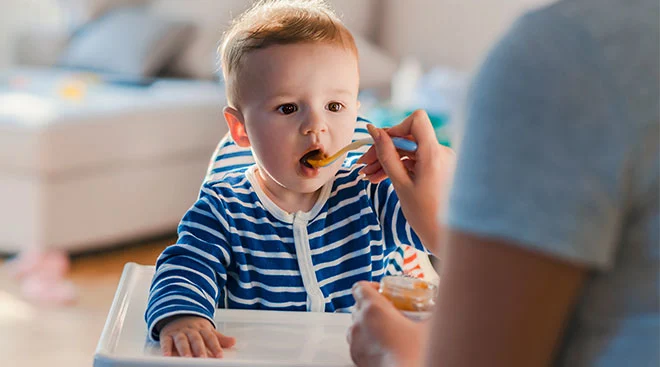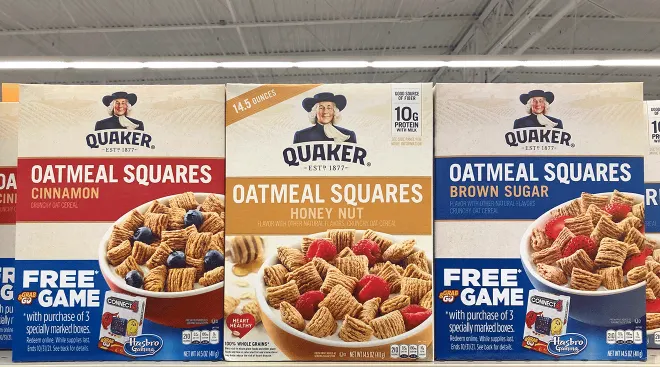These Leading Baby Food Brands Contain High Levels of Toxic Metals
An new report has found that several brands of widely sold baby foods contain a dangerous amount of toxic heavy metals, including arsenic, lead, cadmium and mercury.
The congressional investigation, led by Democratic Rep. Raja Krishnamoorthi of Illinois, chair of the House Subcommittee on Economic and Consumer Policy of the Committee on Oversight and Reform, looked at test results and documentation from four baby food brands and found that all four contained heavy metals.
Following reports of high levels of toxic heavy metals in late 2019, the investigation requested internal documents and test results from seven of the largest manufacturers of conventional and organic baby food in America. These were the companies behind well-known brands, including Happy Family Organics, Beech-Nut, Earth’s Best Organic, Gerber, Plum Organics, Parent’s Choice and Sprout Organic Foods.
Four of the parent companies of these brands—Happy Family Organics, Beech-Nut, Earth’s Best Organic, and Gerber—responded to the requests. They submitted their internal testing policies, test results for ingredients, and documentation about what they did with products that exceeded their internal testing limits. However, Plum Organics, Parent’s Choice and Sprout Organic Foods refused to cooperate with the investigation.
“The Subcommittee is greatly concerned that their lack of cooperation might be obscuring the presence of even higher levels of toxic heavy metals in their baby food products than their competitors’ products,” the report says.
The Food and Drug Administration, World Health Organization, American Academy of Pediatrics and Centers for Disease Control and Prevention all agree that even low levels of exposure to heavy metals can be very damaging to babies’ brains. Yet, according to the Environmental Working Group, there is only one FDA guideline for baby food, which sets a limitation on arsenic levels in infant rice cereal (even this limit, many experts consider to be too high to protect against adverse effects). Otherwise, the FDA doesn’t have any standards on baby food and toxic metals.
The report found that some of the brands reported up to 91 times the arsenic levels, up to 177 times the lead levels, up to 69 times the cadmium level and up to 5 times the mercury levels the FDA set for drinking water. It’s important to note that while some heavy metals do occur naturally in food, the report notes that the levels may increase with other added ingredients containing metals, like enzymes, vitamin and mineral mixes.
“To this day, baby foods containing toxic heavy metals bear no label or warning to parents. Manufacturers are free to test only ingredients, or, for the vast majority of baby foods, to conduct no testing at all,” the report states.
"This compelling new evidence lays bare the FDA’s clear failure to protect babies from the toxic heavy metals in their food,” said Charlotte Brody, national director of Healthy Babies Bright Futures (HBBF), which conducted the initial investigation in 2019. “While the FDA studies the problem and companies set lax internal standards, millions of babies are exposed to these contaminants every day. It is time to step up and finally take clear action.”
“The science on these toxic metals is clear: There is no question of the harm they cause to babies’ developing brains,” Jane Houlihan, HBBF’s research director added. “Parents can only do so much to shop their way out of this problem. We need fast action by the FDA and baby food companies to protect our vulnerable infants.”
The report’s recommendations are as follows:
- Mandatory testing: The baby food manufacturers should be required by the FDA to test their finished products for toxic heavy metals, not just the ingredients they use.
- Labeling: Manufacturers should be required by FDA to report levels of toxic heavy metals on food labels.
- Voluntarily phase-out toxic ingredients: Manufacturers should voluntarily find substitutes for ingredients that are high in toxic heavy metals, or phase out products that have high amounts of ingredients that frequently test high in toxic heavy metals, such as rice.
- FDA standards: FDA should set maximum levels of toxic heavy metals permitted in baby foods. One level for each metal should apply across all baby foods. And the level should be set to protect babies against the neurological effects of toxic heavy metals.
- Parental vigilance: Parents should avoid baby foods that contain ingredients testing high in toxic heavy metals, such as rice products. Instituting the above recommendations will help give parents the information they need to make informed decisions to protect their babies.
“Baby food manufacturers hold a special position of public trust. Consumers believe that they would not sell products that are unsafe. Consumers also believe that the federal government would not knowingly permit the sale of unsafe baby food,” the report says, adding that both the government and the manufacturers have broken this trust.
The bottom line: Many experts feel there need to be clearer standards from the FDA when it comes to the safety baby food.
While the report is worrying, there is a lot parents can do to protect their children. The AAP released a statement answering some of parents’ questions following the report. They include a number of things parents can do to protect their child from exposure to heavy metals.
HBBF also recommends switching packaged snacks for apples, unsweetened applesauce, bananas, cut grapes, yogurt or hard-boiled eggs. They also recommend swapping rice cereal for other grains like oatmeal, corn, barley and quinoa, as well as replacing fruit juices with tap water or pureed fruits.
In addition to these swaps, parents might also consider making their own baby food to ensure it’s nutrient-rich and toxins-free. For more information on how to do so, check out our tips and some recommendations from experts.
Please note: The Bump and the materials and information it contains are not intended to, and do not constitute, medical or other health advice or diagnosis and should not be used as such. You should always consult with a qualified physician or health professional about your specific circumstances.
Navigate forward to interact with the calendar and select a date. Press the question mark key to get the keyboard shortcuts for changing dates.




















































